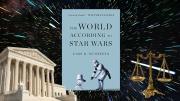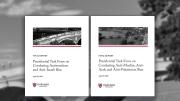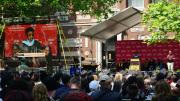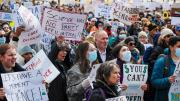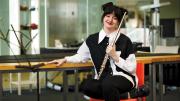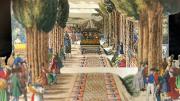1928 The editors proudly report that the new Fogg Art Museum, "with its handsome travertine court and garden-in-progress, though less than a year old plays a notable part in the life of the University": preserving Harvard's unique historic look amid the "rapid growth of Cambridge as a city of factories and apartment houses."
1933 The Board of Overseers authorizes chemistry professor James B. Conant's selection as the University's twenty-fifth president. The 40-year-old becomes one of the youngest presidents in Harvard history.
1938 At the cornerstone-laying ceremony for Littauer Center, the new home of the new Graduate School of Public Administration, inaugural dean John H. Williams tells the audience that "questions confronting governmental administrators today cannot be answered in terms of any one discipline alone, but the economist, the political scientist, the sociologist, and the lawyer all have contributions that may lead to a broader and clearer understanding...."
1943 Three Harvard men Robert Frost '01, Litt.D '37, Lt. Cmdr. Samuel Eliot Morison, USNR, '08, and George Weller '29 receive Pulitzer Prizes for poetry, American biography, and journalism respectively. And "the University itself [is] uniquely identified" with the Pulitzer Prize-winning musical composition, "Secular Cantata No. 2, A Free Song," by William Schuman of Sarah Lawrence College, which was "first performed by the Harvard Glee Club and the Radcliffe Choral Society with the Boston Symphony Orchestra."
1948 The U.S. House Armed Services Committee approves a two-year draft, leading to predictions of 500 Harvard draftees per year and causing dean of Harvard College Wilbur J. Bender to foresee financial deficits for the College, but not "the return to special wartime measures such as midyear finals or summer terms."
1953 A tuition increase of $200 is approved for Harvard College, raising the next term's total cost to $800, "bringing Harvard's annual charges almost exactly in line with those of other comparable institutions, where the fee varies from $790 to $850." (For the current freight, see "Tuition Takes Off" in "Brevia".)
1968 Missing the flora of his native California, a homesick Harvard undergraduate seeks and receives special permission to plant a bed of flowers on the south side of Thayer Hall. Glen Schneider '71 "had a field day planting daffodils, crocuses, jonquils, and tulips in clumps around the bushes," in this unusual departure from the University's policy of excluding flower gardens from Harvard Yard property.
1973 "Flying in the face of tradition," a committee representing a cross-section of the Harvard community reschedules the annual alumni meeting and alumni parade to Wednesday afternoon, a day before Commencement, rather than at the long-standing time of Commencement afternoon. When rain pours down on Wednesday, experienced alumni grumble that it's "asking too much to expect two fair days in a row."
1983 The Faculty of Arts and Sciences has completed its review of the Core Curriculum, report the editors, "and on the whole found it good."
1988 Despite a noticeable dip in the number of American 18-year-olds, applications for Harvard's incoming freshman class of '92 set a new record: 14,386. (The previous year's total, also a record, was 14,220.)
